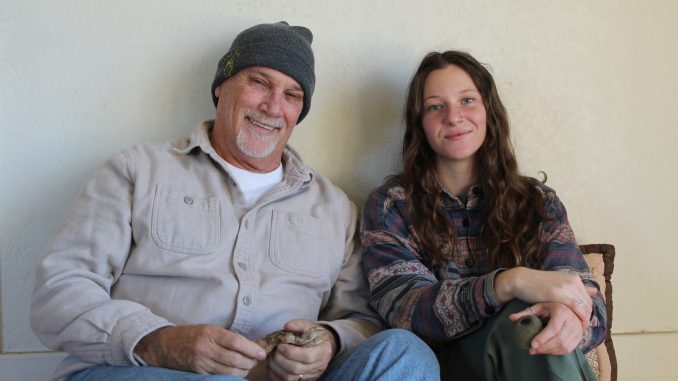
Kim Michl-Green likes to start Climate Cafe gatherings with a request.
She asks the people who’ve assembled at the South Chico Community Assistance Center to go over to a windowsill illuminated by lamplight. There, they find an assortment of natural objects.
Pick the one that speaks to you the most.
Among the objects are a pine cone, a shriveled citrus fruit, a feather, a dried flower with magenta petals and a simple pebble.
Once they’ve decided, attendees grab a multicolored pillow and sit on the wood floor, object in hand. Then everybody introduces themselves and explores the significance of the object they chose: What does it make them feel, and how does it relate to their feelings about the climate crisis?
What follows is a free-form, informal discussion. Attendees are invited to get comfortable and enjoy food and drink while unpacking the difficult topics of the climate crisis and climate anxiety. Nina, Michl-Green’s dog, serves as an emotional support animal, snuggling with people while they share.
Climate cafes are designed to be confidential, nonjudgmental spaces where people can openly share their feelings about the climate crisis. There is no call to action, no activity sign-ups nor future commitments expected.
Michl-Green launched these free monthly gatherings in August through her work with the nonprofit South Chico Community Assistance Center (see infobox). The cafes have become a vital outlet for people to process their climate-related emotions and anxieties, find community support and feel more empowered about tackling what often feels like an insurmountable challenge. It’s a vulnerable space where people express a range of emotions including grief, sadness, despair, dread, hopelessness and anger, Michl-Green said, but it’s also one that cultivates connection, a sense of belonging and validation from others, providing relief and hope.
“We’re seeing there’s a lot of cognitive barriers behind people being able to grasp the weight of the climate crisis. It’s too much to bear,” Michl-Green said. “It’s really important to be able to have spaces to have conversations and look at it with other people, because when you look at it with other people it makes it more bearable.”
Global to local
Michl-Green, a recent Chico State graduate with a degree in psychology, first heard about climate cafes through Mark Stemen, a professor in the geography and planning department at Chico State who also serves on the city’s Climate Action Commission. They met when she enrolled in one of his classes.
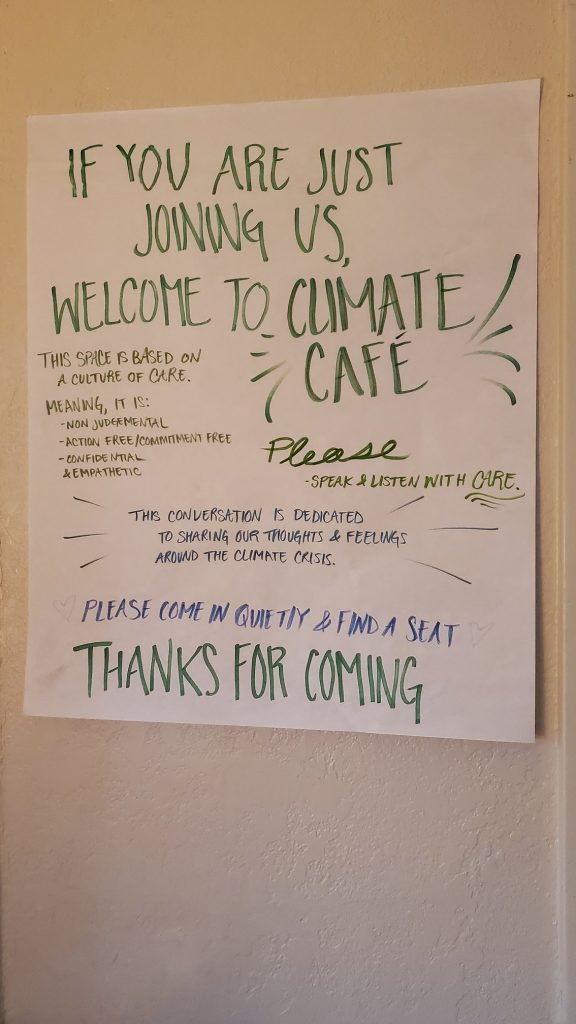
“He was kind of the first radical professor that I had at Chico State who was willing to look with both eyes open at the climate crisis and be able to hold those kinds of feelings and validate them back to me,” she said.
One day after class, he brought up the concept of climate cafes, which are hosted by different organizations around the world and are modeled after death cafes, where communities gather to openly discuss their thoughts and feelings about death and dying in an informal setting.
Michl-Green began researching the topic, which she found to be a perfect intersection of her background in psychology and her concerns regarding the climate crisis. She received her training and certification to facilitate cafes through the Climate Psychology Alliance, an international group of therapeutic practitioners, researchers, artists and individuals focused on “attending to the psychology and emotions of the climate and ecological crisis,” according to its website (climatepsychologyalliance.org).
Stemen, a center board member who spearheads the organization’s climate initiatives, partnered with Michl-Green to provide the physical space for the cafe. He’s a regular attendee who said the most rewarding part for him is hearing “the shift in people’s voices as the cafe evolves” and the change in their outlook from one of despair to hope.
“You can tell that they really needed this space and that when they found it, it’s really magical,” Stemen added.
Michl-Green initially didn’t know what to expect when it came to community reception of the cafe, she said. However, attendance quickly grew to capacity (about a couple dozen) with minimal advertising—mostly via social media and word of mouth—and people have been very open.
“I’ve been surprised in people’s ability and desire to get vulnerable and really share, because it’s hard to get vulnerable with a bunch of people, especially when you don’t know them and you’re in a new space,” she said. “Every meeting, I think, someone cries, which is great! It’s so great that people are able to express themselves and feel safe enough to do so.”
Attendees are a mix of new faces and regulars, which Michl-Green said she believes speaks to “the very high need for these spaces.” The center would like to expand its offerings and host more than one climate cafe a month, given the interest, but that will depend largely on financial support via donations, Stemen added.
Jared Geiser has attended a couple of the local gatherings, where he has been able to connect with others who also understand the severity and seriousness of the climate crisis, he said. Geiser, who is involved in multiple climate and environmental advocacy groups, started experiencing intense grief while learning about climate change as a Chico State student, feeling overwhelmed by the weight of the knowledge he gained about climate projections and ecosystem and species collapse.
“There’s been times I’ve had severe climate anxiety, just worried about the future, and I haven’t had places to turn,” he said. “As people learn about the greatest threat of our time, having that outlet in Chico for people to connect with others and share their thoughts and feelings allows it to be more bearable and acknowledge the elephant in the room—and that’s climate change.
“The Climate Cafe provides such a valuable space to connect with other people that are concerned about it and make me feel reassured that we can tackle this issue when we come together,” Geiser continued. “When you talk about it, it helps you feel empowered. We’re not in this alone. There’s other people who care about this.”
The internal, emotional work the cafe encourages can help people get to a place where they are ready to take direct action.
“It makes us more empowered to confront and challenge things that are threatening the climate,” Geiser said.
Nurturing resilience
During the November cafe gathering, Stemen chose the wooden floor for his natural object. He ran his hands along the boards as he spoke about how the old building had once gone through restoration. He noted the hard work that was put in to preserve the floor, the foundation of the group’s meeting that day.
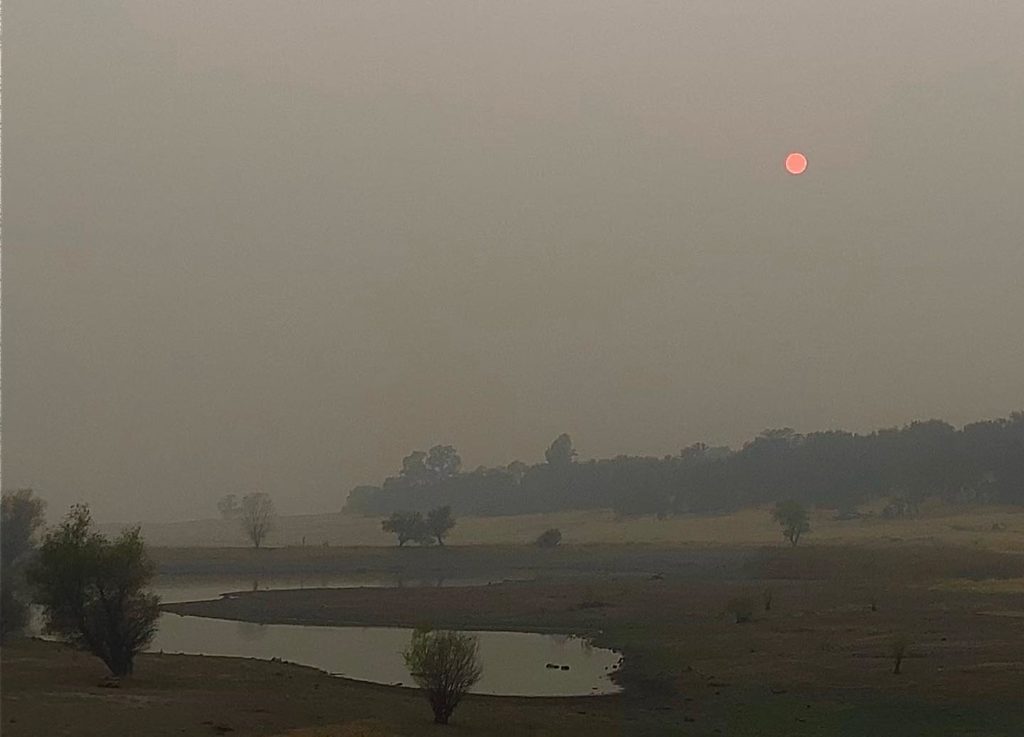
This made him reflect on his involvement in climate work and with the cafes—he wants to lay a strong foundation to help younger people cope and forge a better future.
Stemen and Michl-Green spoke of the value of having a cafe in a place like Chico—a frontline community that has experienced extreme heatwaves, severe drought and mega wildfires as a result of climate change.
“This is really a way to help increase our compassion stamina. To rebuild our own inner resilience to then help create the space for outer resistance,” Stemen said. “This is really the inner work that allows us to keep going. Burned-out people can’t help a burned planet.”
At that same gathering in November, Michl-Green shared that she recently planted a passion fruit vine. She tended to it with no expectations, and it flourished. One day, she was delighted to notice dozens of caterpillars on the leaves and in the flowers.
It was a reminder of the power one seemingly small action taken by one person can have on the environment. Not all is lost, and humans can make a difference and help the world recover, she said.
Rather than carrying the weight of everybody’s grief, uncertainty or dread as climate cafe facilitator, Michl-Green shares the same experience as many of her attendees: “I always leave the space feeling uplifted … more hopeful and optimistic,” she said.
“I really do think it comes down to the solidarity and the validation of other people,” Michl-Green added. “I think that there’s nothing that we can’t accomplish when we’re all together.”
Where to go:
The Climate Cafe is hosted monthly at the South Chico Community Assistance Center, 1805 Park Ave. The schedule is pending for 2023. Find out more by emailing info@southchicocac.org.

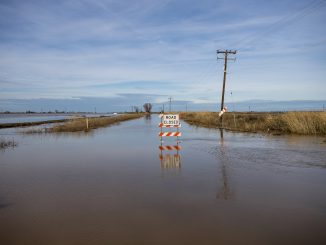
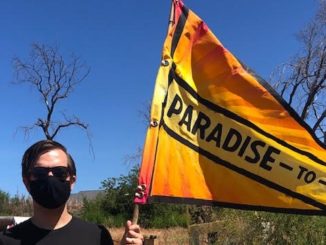
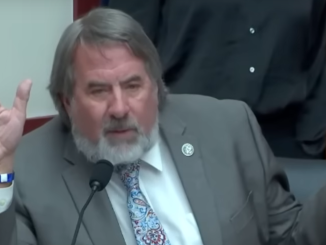
Be the first to comment